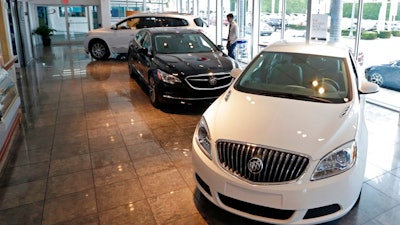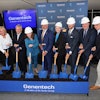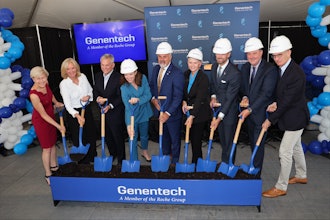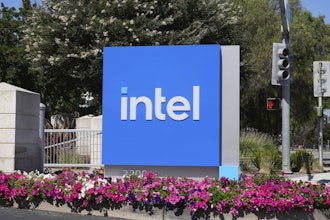
DETROIT (AP) — July saw the biggest year-over-year decline in U.S. vehicle sales so far this year, leaving automakers to hope that consumers are just waiting to pounce on Labor Day deals.
U.S. sales of new cars and trucks fell 7 percent to 1.4 million in July, according to Autodata Corp. It was the seventh straight month of lower sales, and the biggest percentage drop so far this year.
July is often a slower month as buyers vacation and wait for dealers to offer model year clearance events in August and September. This year, big cuts in sales to rental car fleets and commercial customers were also a factor. Hyundai, for example, cut its fleet sales by 77 percent in July.
General Motors said its sales fell 15 percent in July, while Hyundai's dropped 28 percent. Ford's sales were down 7.5 percent. Fiat Chrysler's sales declined 10 percent. Volkswagen's sales fell 5.8 percent, while Nissan's sales fell 3 percent. Honda's sales were down 1.2 percent.
Two major automakers bucked the trend. Toyota's sales rose 3.6 percent while Subaru's were up 7 percent.
Analysts have been predicting lower U.S. sales this year as demand levels out after an unprecedented seven straight years of growth. U.S. new vehicle sales hit a record 17.55 million last year.
July's pace would put annual sales at 16.7 million. That was lower than expected for Alec Gutierrez, a senior market analyst with the car shopping site Kelley Blue Book. Still, he's maintaining his full-year forecast of 17.1 million sales.
Mark LaNeve, Ford Motor Co.'s U.S. sales chief, said automakers have been preparing for lower U.S. sales this year. He doesn't see July as an acceleration of the downward trend. He said GM's decision to cut sales to low-profit rental car fleets by 81 percent — or 11,200 vehicles — was a big factor. Ford also cut fleet sales by 26 percent, and had to stop sales of its Transit commercial van for a few weeks while it performed a recall.
"We're still operating at a very high level," LaNeve said.
Automakers continue to see healthy profits thanks to consumers' preference for SUVs. Car shopping site Edmunds.com said the average price paid for a new vehicle in July was $34,558, 2 percent higher than the same month a year ago. GM said sales of its recently updated GMC Acadia SUV jumped 30 percent, while sales of Toyota's RAV4 SUV rose 36 percent to 41,804, a monthly record.
But car sales are plummeting, hurt by low gas prices and changing tastes. Sales of the Ford Fusion midsize sedan dropped 42 percent, while sales of the Chevrolet Spark subcompact fell a whopping 82 percent.
Automakers ramped up deals in July, a trend that's expected to continue for the rest of the summer as carmakers make way for 2018 models on their lots. Average interest rates on new-vehicle loans fell to a six-month low of 4.77 percent in July as more brands offered zero-percent financing deals, Edmunds said. Toyota was offering zero-percent financing for 72 months on a 2017 Toyota Camry sedan as the 2018 Camry arrived in dealerships.
Gutierrez said buyers can expect incentives to creep up by $200 or so per car in August and September.
Automakers said Tuesday:
— General Motors Co. said sales fell 15.4 percent to 226,107. GM saw double-digit percent declines at GMC, Chevrolet, Cadillac and Buick. Sales of GM's best seller, the Chevrolet Silverado pickup, dropped 15 percent.
— Toyota Motor Corp.'s sales rose 3.6 percent to 222,057. Toyota and Lexus trucks and SUVs climbed 17 percent but cars struggled. Sales of the Toyota Prius hybrid fell 26 percent.
— Ford Motor Co.'s sales dropped 7.5 percent to 200,212. Ford's SUV sales were up 2 percent but car sales dropped 19 percent. Sales of Ford's best seller, the F-Series pickup, rose 5.8 percent.
— Fiat Chrysler's sales fell 10 percent to 161,477. Its Jeep, Chrysler, Dodge and Fiat brands all saw declines, but Alfa Romeo sales were up. Ram truck sales were flat.
— Honda Motor Co.'s sales slid 1.2 percent to 150,980. In a reverse, sales of the Civic small car rose 11 percent while sales of the CR-V SUV fell 12 percent.
— Nissan Motor Co.'s sales fell 3.2 percent to 128,295. Sales of Nissan's redesigned Titan pickup truck more than tripled, and Infiniti luxury brand sales were up. But car sales dropped 11 percent.
— Subaru brand sales gained 6.9 percent to 55,703. Subaru's best-seller, the Outback SUV, was up 20 percent.
— Hyundai's sales dropped 27.9 percent to 54,063. Sales of its Tucson SUV rose 46 percent, but that couldn't overcome deep cuts to rental fleets.
— Volkswagen brand sales fell 5.8 percent to 27,091 as dealers sold off older Tiguan SUVs and started getting 2018 models on their lots.






















